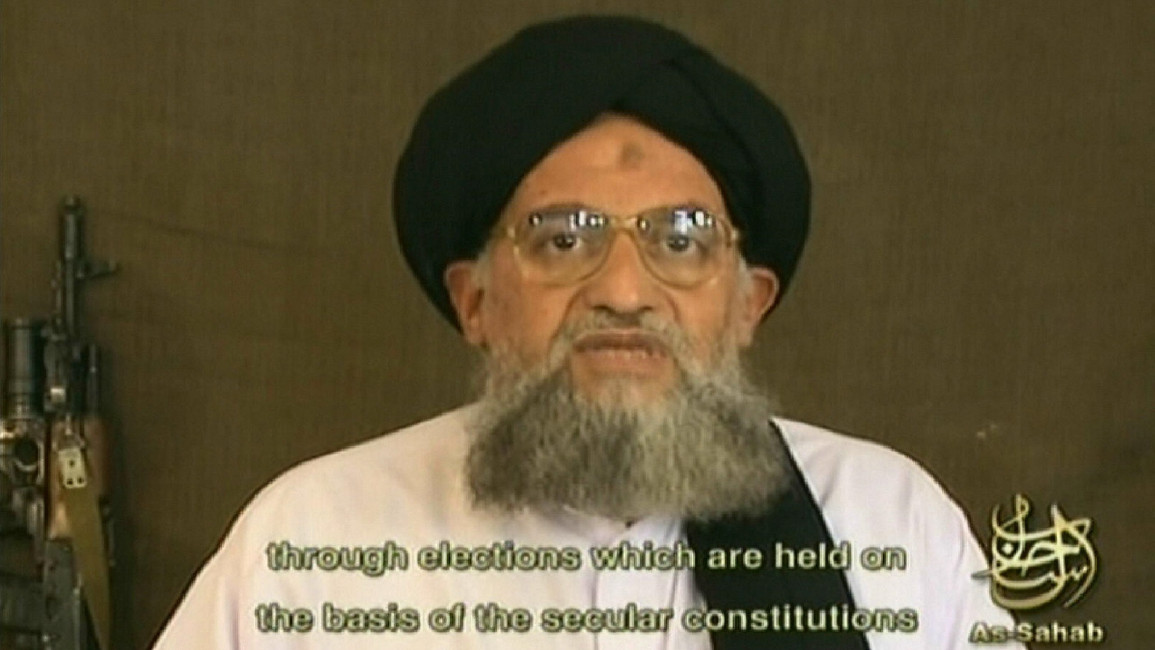Free Syrian Army: Al-Nusra Front will fall with regime
The Nusra Front's fighters are mostly Syrians who took up arms rather than being ideological extremists, sources in the moderate rebel umbrella group the Free Syrian Army told The New Arab, downplaying Ayman al-Zawahiri's purported message.
"More than ninety percent of the Front's fighters are ordinary Syrians who took up arms to defend their families after the regime started killing Syrians, and found strong support in the Front," sources in the FSA speaking on condition of anonymity said.
The Nusra Front has sometimes attacked other rebel factions, including the FSA.
"They will return to their jobs as soon as the war ends, and do not intend to establish an Islamic emirate in Syria," the sources claimed.
Sources in the Syrian opposition contacted by The New Arab declined to comment on al-Qaeda's leader's message, dismissing his views as "unworthy of pause."
 |
Nusra fighters will return to their jobs as soon as the war ends, and do not intend to establish an Islamic emirate in Syria |  |
Zawahiri had praised the Nusra Front in the audio recording posted online, saying that "if Muslims in Syria choose an Islamic government and an imam' to rule them, this would be al-Qaeda's choice."
 |
| Jihadist 'Pawns' in Syria [The New Arab] |
The leader of al-Qaeda urged warring fighters in Syria to unite while criticising the Islamic State group.
Ayman al-Zawahiri also criticised the UN-backed political process to find a solution in Syria in the clip posted on Sunday.
"We have to want the unity of the Mujahideen in Sham [Syria] so it will be liberated from the Russians and Western Crusaders. My brothers ... the matter of unity is a matter of life or death for you," Zawahiri says.
 |
The leader of al-Qaeda urged warring fighters in Syria to unite while criticising the Islamic State group |  |
Al-Nusra Front is part of an alliance of armed groups known as Jaish al-Fatah, which is leading battles against Syrian President Bashar al-Assad's forces and his Russian and Iranian-backed allies in the southern Aleppo countryside.
In January, al-Nusra Front tried unsuccessfully to convince rival Sunni factions – including the powerful Ahrar al-Sham – to merge into one unit.
As successor to Osama bin Laden, Zawahiri has the allegiance of al-Qaeda branches in the Middle East, North Africa and South Asia.
The authenticity of the recording, the first since January, could not be immediately verified, but it had the hallmarks of previous Zawahiri tapes.
 |
As successor to Osama bin Laden, Zawahiri has the allegiance of al-Qaeda branches in the Middle East, North Africa and South Asia |  |
He is believed to be hiding in a border area between Afghanistan and Pakistan.
Zawahiri also emphasised the ideological divide between al-Qaeda and IS.
He described IS as "extremists and renegades" whose followers would eventually disavow their beliefs and methods.
Al-Qaeda's dominance is being challenged by IS, which controls territory in Syria and Iraq and has branches in Libya and Yemen.
Al-Nusra and its allies have made gains in its recent weeks in Aleppo at the expense of government forces.
The Syrian uprising, which started with largely peaceful protests in 2011 against the Assad government, has descended into a major conflict that has pulled in regional and global powers.
Violence has left nearly half a million people dead and displaced half the country's pre-war 22 million population.
Agencies contributed to this report



